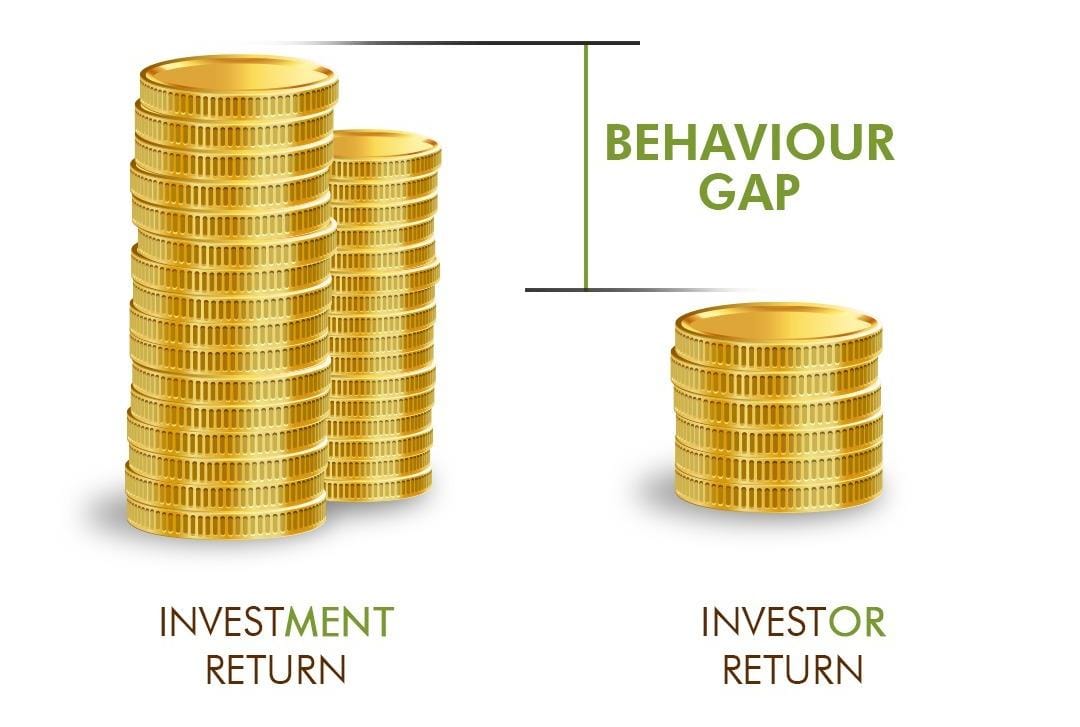We are not always as rational as we think we are when it comes to money and investing. Many investors automatically conjure up images of a crash or a bear market when they hear the term “Market Correction”. The one stock market mantra that everyone loves is: Buy low and sell high! Yet, few follow this. Why does this happen? Because often it is too easy to fall victim to our own emotions.
There is an old saying on Wall Street, “Financial markets are driven by just two powerful emotions – Greed and Fear”. These two emotions can cause damage to our lives as well as our portfolios. Investor behaviour driven primarily by Greed and Fear is responsible for the soaring highs in bull markets and subsequent crashes in bear markets. In behavioural finance, this is called ‘The Greed & Fear Cycle. But if you do not let greed and fear affect your investment behaviour, you can be in a much stronger position to meet your financial goals. But, let’s first see how they practically influence our minds over money.
Everyone wants to get rich faster and investors are no exception. Bull markets provide a great opportunity to make profits in a short period and many investors in the stock market fall into this trap. When the price keeps rising, more and more people invest more and more money in equities. With higher demand, and more money, the prices keep rising further and profits grow. Growing profits fuel more greed and more money gets invested, raising prices to irrational levels. At very high prices, asset bubbles are created i.e. prices are much higher than the intrinsic or fundamental value of assets. Eventually, the bubble bursts and the market crashes. Investors who had bought stocks at very high prices face losses when the market corrects. In the times like these, it’s crucial to maintain an even keel and adhere to the fundamentals of investing, such as maintaining a long-term vision, resetting the desired asset allocation and ignoring the herd, whether the herd is buying or selling.
Fear and Greed are two sides of the same coin. Just as the market can become overwhelmed with greed, it can also succumb to fear. When stock prices fall sharply, investors fear that they will fall more and sell in panic. Panic selling causes stock prices to fall sharply. Ultimately, prices fall to irrational levels and the markets eventually bottom out. Recently, at the start of the Covid, the markets were depressed, and everyone panicked and started selling the stocks, leading to a market crash. Just as greed dominates the market during a boom, fear prevails following its bust. To limit losses, investors quickly sell stock and buy safer assets, like money-market securities, and principal-protected funds, i.e., low-risk but low-return avenues. So instead of making the most of the opportunities available, people exit equities and convert notional losses to realised losses.
“Individuals who cannot master their emotions are ill-suited to profit from the investment process.” – Benjamin Graham.
All this discussion of fear and greed relates to the volatility inherent in the stock market. When investors find themselves outside their comfort zones due to losses or market instability, they become vulnerable to these emotions, often resulting in very costly mistakes. You cannot control the market but you have control over your actions. Your actions will determine whether you make a profit or loss in stocks or mutual funds. Avoid getting caught up in the dominant market sentiment of the day, which can be driven by irrational fear or greed, and stick to the fundamentals. This isn’t as easy as it sounds. So, let us see some of the ways to take control of your emotions and make sure fear and greed do not influence your trading decisions or overall success:

Having a definite plan in place while investing in equities ensures that you stay on track and avoid any emotional impulse that may deviate you from the plan. Simply, stick to your investment plan, and your asset allocation, despite the rise or fall in markets. Investors without a definite plan can make poorly timed entry or exit decisions based on greed when stocks are on the rise and based on fear when they’re dropping. The market value of your investment may rise, fall and rise again. Doing nothing except rebalancing your asset allocation and being disciplined is the best course of action.
One popular myth is that the stock market is the place where people can get rich quickly. However, the fact is that equities are a great place to grow wealth but, in the long run only. So, if you wish to see your money grow multifold, abide by patience and let your investment grow. Do not get extra greedy and stop looking for the next multi-bagger stock or hunt for tips from amongst your friends and fellow investors. Taking the extra risk, trading, playing with futures & options, etc. just to make the big money in the short term without any real knowledge, and understanding can potentially destroy years of good work in a matter of few days.
As an investor, you should keep a regular/periodic track of your investment and its composition monthly or in case of extreme market movements. There is no need to keep a daily track of the same or of the underlying mutual fund schemes or stocks, except when revisiting your portfolio, let’s say on a yearly frequency. With periodic tracking, you can assess if your investments are aligned with your risk profile and your planned goals or not. This can help you make analytical decisions while putting your emotions aside. Further, it also gives you the ability to rebalance your investment portfolio as and when required.
Nobody is at the pinnacle of knowledge when it comes to investments. Learn about asset classes, investment products, insurance, taxation, estate planning, and so on. Learn how to decode the jargon and read through the market noise. Most importantly, learn from the mistakes of others and from the experience of iconic wealth creators and investors. Further, try to also avoid what the news channels and publications are airing 24×7, trying to influence you to trade often. Rather than blindly following what others are doing, see if there exists a better contrarian strategy. Remember the lessons you have learned from your own experience too as you mature in your financial journey.
HANDLING VOLATILITY IN MARKETS https://ghanchiinvest.com/investors-reacting-response-market-movement-correction/
Emotions can play a big part in investing and if you are influenced by your emotions, you are likely to make mistakes. Keeping these emotions away when investing is challenging. With knowledge, experience, conviction and a sound investment plan, you can slowly start moulding yourself into the wise investor you want to be. We strongly believe that a sustained long-term wealth creation journey requires a helping hand. A financial products distributor or an expert is strongly recommended. The primary role of such a person is to handhold clients to navigate through the challenges and mould their financial behaviour. Reach out to your Financial Advisor or expert to guide you from time to time and during such periods of uncertainty. Nevertheless, investing is about setting you independent and free, not making you addicted to a trading screen. And if you want to invest in safe instruments that are most likely to help you with your financial goals, and wealth creation and/or if you want to retire rich, kindly call us at +91 9820926446/7977061717 or mail us at chandrakant@ghanchiinvest.com Happy Investing!
Also read our Blog on Single Woman, Retiring Solo Is a Dream Retirement Life (but) With Proper Planning!
https://ghanchiinvest.com/single-woman-retiring-solo-is-a-dream-retirement-life-but-with-proper-planning/





